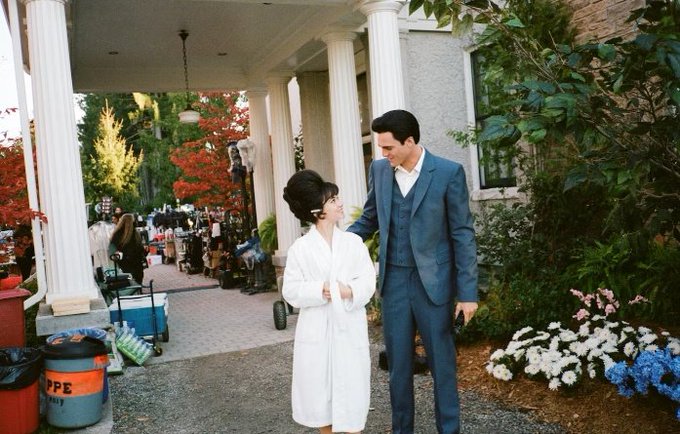As a filmmaker, Sofia Coppola masters using superficialities to expose deeper feelings. Arguably, no other working director is more gifted at understanding and conveying with intimacy the feelings of being a young girl. Through films often centered on young women surrounded by surface-level beauty, Coppola reveals subdued, personal glimpses at the underbelly of wealth and fame.
Her latest film “Priscilla” combines all of the director’s thematic fortes to turn the tables on the story of one of the 20th century’s most recognizable couples, Elvis and Priscilla Presley (played by Jacob Elordi and Cailee Spaeny, respectively, in phenomenal performances). Coppola tells the love story strictly from Priscilla’s point of view, who, at the age of 14, is pulled into the orbit of and falls in love with the biggest musician in the world, Elvis.
We meet Priscilla in 1959 while she lives with her family at a U.S. Army Base in Germany. She sits at a diner counter when a friend of Elvis, who is serving as a GI on base, approaches her. The friend extends an invitation to a party at Presley’s home. We feel the tremors that shake Priscilla’s world as she meets Elvis and experiences the headrush of first love. Though the film does not play any Elvis music or show him performing, the natural charisma that made him the most famous man in the world shines through his personality in subdued and intimate ways that make it easy for Priscilla to fall for. In him, she finds a friend and confidante with whom she can share her pangs of homesickness.
From an outsider’s perspective, a courtship between the massively famous Elvis and a ninth-grade girl 10 years his junior raises a few eyebrows, a fact which is not lost on Coppola. While the film doesn’t explicitly paint him as having cruel intentions, it emphasizes the power imbalance between them. He refuses to consummate their relationship until they are married. Whether this is because he wants to demonstrate how much he values her or because he does not want to deal with the moral and legal implications of sleeping with a teenager is unclear.
When Elvis is discharged and returns to the U.S., Priscilla is heartbroken, and she struggles to return to her quiet high school life. Elvis’s communication goes silent for months until Priscilla receives a first-class plane ticket to visit his Graceland estate. After a whirlwind weekend, she returns home disheveled and grief-stricken. It isn’t long after that her parents are (for some reason) persuaded to allow her to finish her schooling in Memphis, Tenn., while she lives with Elvis.
Once at Graceland, in the periphery of Elvis’s fame, she struggles to find her place. She is left to herself while Elvis is often away shooting new films or performing on tour, leaving her with plenty of space and time, though not many options to occupy it with. His posse of male friends accompany him with amusing boyhood antics wherever he goes, his unseen label heads make decisions for his career and his grandma prepares home-cooked meals. She is simply his Cilla, the object of his desire. When she asks to get a job at a local boutique, he says no: he needs her to be there for him when he calls. She must learn to toe the line between being supportive and speaking her mind while also handling the velocity at which Elvis’s demeanor can change. While never explicitly violent towards her, the film communicates that, because of who he is, he can get away with more, and she is forced to learn how to navigate that.
At some points, the pacing of the film feels unbalanced. Coppola spends much of the movie setting up the Presleys’ relationship, only to have it quickly wrap up in the third act. Having arrived at the estate as a girl, she aged into womanhood within its walls, which, though once beautiful and enigmatic, quickly becomes a cage from which she must escape before becoming another object trapped inside its pearly gates.







































































































































































































